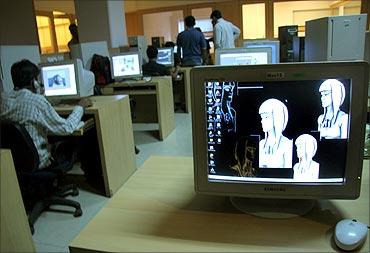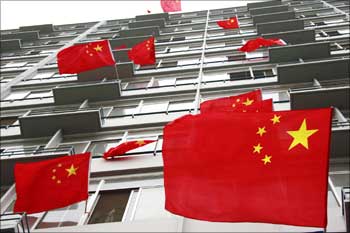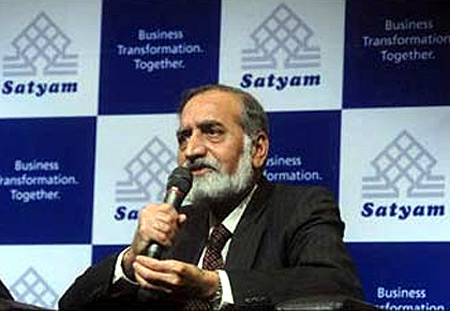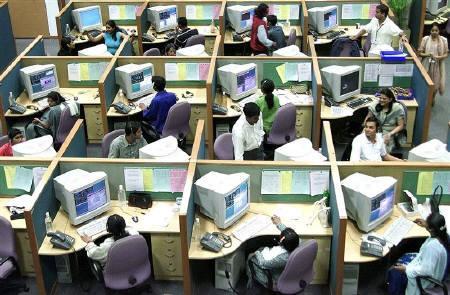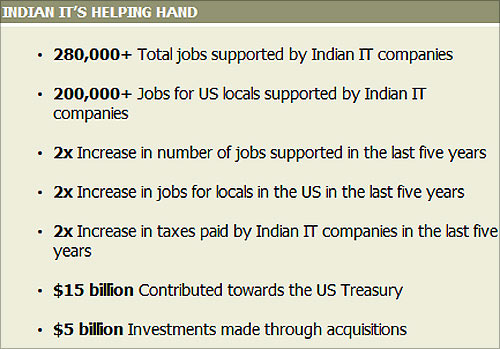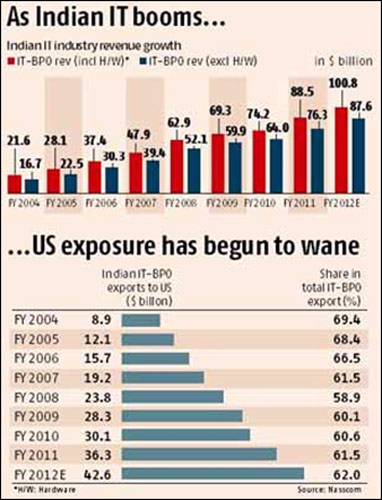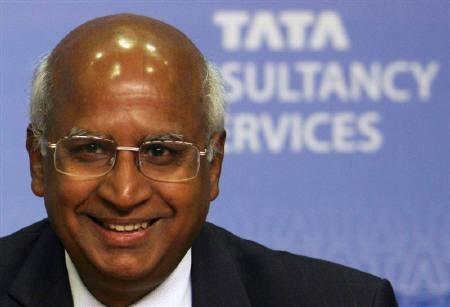 | « Back to article | Print this article |
Indian IT companies defused US outsourcing bogey
It is election time in the US. So, it's no surprise that the unwanted mantle of "outsourcer-in-chief" is being tossed back and forth between President Barack Obama and the Republican Party's Presidential nominee, Mitt Romney.
Curiously though, the Indian information technology (IT) industry, a favourite whipping boy during the 2004 and 2008 White House races, has largely been spared the sharp rhetoric that it had slowly grown accustomed to, and that too in the midst of a lacklustre US economy.
There are two main reasons for this. First, the US today has bigger economic headaches than outsourcing. "The country has lost more jobs to manufacturing than to services," says T V Mohandas Pai, a former director at Infosys, "So, much of the rhetoric now is about that," he adds.
Click NEXT to read more...
Indian IT companies defused US outsourcing bogey
That probably explains why China's manufacturing powerhouse, instead of Indian IT, has found itself smack in the middle of the US Presidential fight. In fact, a recent study by the Pew Research Centre found that 56 per cent of US respondents feel that their government should "be tough" with China on economic or trade issues.
Hired in the USA
At the same time, the Indian IT armada, too, has evolved. In the last five years, according to the industry's apex body, Nasscom, Indian IT firms have increased their investment in US-based centres by almost 10 times.
This has meant that from having around 58,000 permanent employees in the US in 2005-2006, the headcount doubled to around 107,000 in 2010-11.
Click NEXT to read more...
Indian IT companies defused US outsourcing bogey
Of these, three out of every four jobs are held by US nationals, and within the larger ecosystem, Indian IT has created 175,000 indirect jobs in the US.
The projections are that over the next five years, the number of seats that Indian IT companies have in the US will double again, bringing with them more investments. In total, the IT industry provides direct employment to about 2.8 million people and indirectly employs another 8.9 million people.
None of this, however, has happened of its own accord. Instead, jolted by the post-Lehman financial crisis, it was the Indian IT industry's scramble to move up the value chain that resulted in companies leaving behind the labour arbitrage game and getting into higher-value work that requires more on-shore presence.
"The problem was that the existing business was getting commoditised," says S Ramadorai, vice-chairman of TCS, India's largest IT services provider. "Reinvention became important."
Click NEXT to read more...
Indian IT companies defused US outsourcing bogey
As a part of this reengineering, Indian IT attempted to decrease its reliance on application development and maintenance services and branched out into consulting, enterprise solutions and other domain-specific segments, where specialised skills are required.
"That is where Indian companies are hiring in the US," adds Pai, who previously led Infosys' human resources team. "And, it will increase," he says.
Padmanabhan Venkataraman, the current head of Infosys' US operations and IT services delivery, says that the growth in the volume and value of business will mean that local headcount growth will continue.
"Last year, we hired about 1,200 (in the US). This calendar year, we will hire up to 2,000. In total, Infosys has about 15,500 employees in the US," he explains. "We will continue to hire in this manner," he adds.
Click NEXT to read more...
Indian IT companies defused US outsourcing bogey
Selling the story
For Nasscom, all this has made selling the Indian IT story much easier. From the blustery 2004 election campaign, where the industry body found itself on the back foot, defending outsourcing and fighting legislations, its campaign today has grown into creating partnerships, alongside a more proactive stance.
Kiran Karnik, as the president of Nasscom between 2001 and 2007, was in the thick of it when the outsourcing bogey was first raised in the 2004 US Presidential race. "The time around 2003-2004 was very tough. We had never faced anything like that before," he says.
"There was a new generation in the US that had never faced job losses (due to the 2002-2003 economic slowdown) and we became a convenient target." So, few in the Indian IT industry were ready for the sharp rhetoric and related actions when it began.
Click NEXT to read more...
Indian IT companies defused US outsourcing bogey
"It started off in 2004, with the Benedict Arnold (an infamous US traitor) label attached to firms that sent jobs overseas. Initially, it (Nasscom's work) began purely as an effort to stop anti-outsourcing legislation. That was the single- biggest driver," says Ameet Nivsarkar, vice-president at Nasscom.
"Over a period of time, it has evolved. We have created partnerships with counterpart associations, like-minded academic institutes, think tanks and researchers," he adds.
That list now includes some 20 partners, from TechAmerica (Nasscom's US equivalent) and the US Chamber of Commerce, to think tanks like the Brookings Institution and the Peterson Institute for International Economics.
Yet, scores of legislative attempts that can make business difficult for Indian IT firms continue to be tabled.
Click NEXT to read more...
Indian IT companies defused US outsourcing bogey
"On the tactical front, this continues. Ninety-nine per cent of the Bills don't see the light of the day and a lot of times, it is just a political statement," Nivsarkar explains. "Often, perceptions are formed on information which is not current. Our job is not just to stop Bills, but to give them correct information. But, we have moved from a defensive position to a more aggressive one. It is important to communicate what benefits are being generated (for the US)."
"The understanding that outsourcing benefits US firms has begun to hit home," adds Karnik.
"Politicians had begun to realise this earlier, and now, it is coming across to the broader public - that US companies cannot be globally competitive without outsourcing."
Yet, recurring challenges like visa allocations remain and the Indian IT industry isn't seen as a part of the US industrial complex, unlike Japanese car makers, for instance, who find themselves deeply integrated into the economy.
Click NEXT to read more...
Indian IT companies defused US outsourcing bogey
A new normal?
Nonetheless, Pramod Bhasin, former CEO of Genpact, India's largest business process outsourcing (BPO) firm, feels that not only has the US industry matured to realise the importance of outsourcing, particularly after the pain of the slowdown, but Indian IT service providers have also improved their offerings.
"In the past, we would do what the customer used to do," says Bhasin, "Today, we can perform tasks better than the customer. Now, it has become virtually impossible for the customer to stop outsourcing."
The result has been that in the last four years, Genpact's headcount in the US has gone up almost fourfold, to about 2,000. These aren't large numbers, but growing local hiring points to a clear divergence from the traditional labour arbitrage model. Talent abroad doesn't come as cheap as in the subcontinent.
Click NEXT to read more...
Indian IT companies defused US outsourcing bogey
Infosys' Venkataraman knows that, given that the company wants local hires to constitute at least 50 per cent of its workforce in countries where it operates, although doubts exist on how this will impact profitability.
"Our experience is that our customers appreciate what we are trying to do. They want us to move up the value chain," he explains, "Margin pressure shouldn't be a big problem for us, given our focus on high-value services," he adds.
But Indian IT firms are yet to master higher-value, non-linear services - where revenue growth is detached from the headcount increase - with most companies deriving less than 10 per cent of their revenue from such models, according to a UBS report from earlier this year, and using a model with more local hiring in international markets will hit margins.
Click NEXT to read more...
Indian IT companies defused US outsourcing bogey
"Given that margins will shrink, they (companies) have to ensure they increase prices, but, to do that, they have to move into higher-value work," adds Karnik. "There will be some shrinkage (in margins) but you have got to accelerate non-linear work."
In a sluggish market that isn't likely to be easy, profitability will remains an issue for some firms in the middle of their transformational curve. However, what is now clear is that the noticeable political resistance to Indian IT that emerged in the last decade has now abated.
"Yes, the political risk is down, although it hasn't died out," says TCS' Ramadorai. "But for how long could they beat the same drum?"
